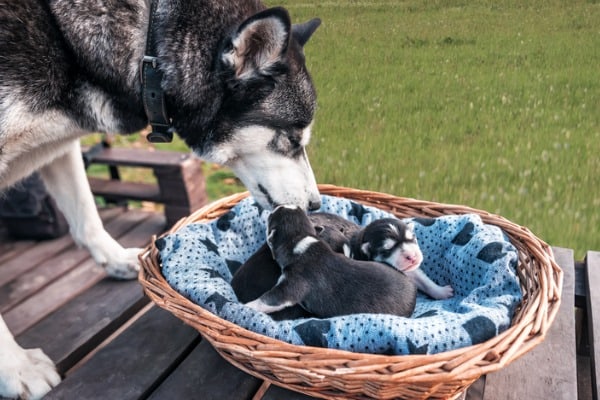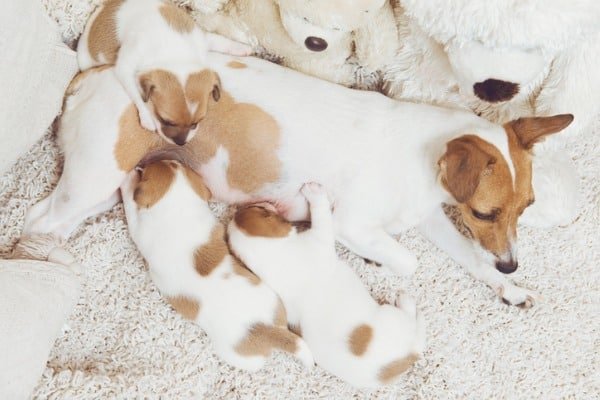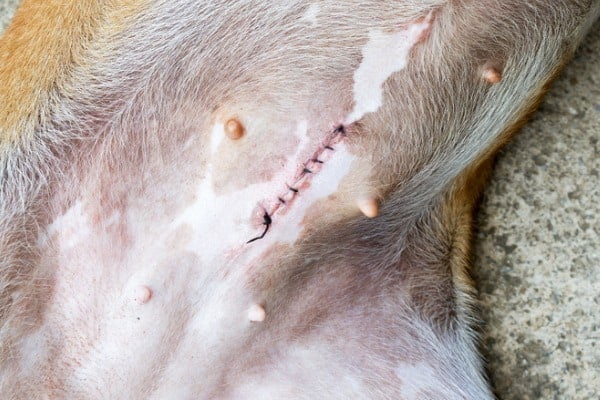
Some studies show that maternal care significantly impacts individuals’ development in many species.
That conclusion is substantial, especially for mammals. Humans, pigs, cats, monkeys, and dogs behaviors, habits, and cognitive abilities are sharply defined by maternal care in the early stages of life.
When it comes to newborn puppies, maternal care is provided by the dam, which gives food, shelter, and warmth to the offspring.
She protects puppies from potential predators and helps them survive and grow safely.
Maternal behavior commonly seen among dogs includes licking, nursing, play, contact, and punishment.
In some cases, the feeling of protectiveness might reach high levels in the dam.
According to experts from Pet Place, that is when the syndromes can be called ‘maternal aggression.’
A dog experiencing it will change from a previously adorable and friendly pet into an unapproachable animal.
A special bond is created between the mother and the offspring due to the release of oxytocin – a ‘bonding hormone.’
Moreover, the high levels of progesterone experienced during pregnancy fall rapidly once the puppy is born.
At the same time, estrogen levels, the activating hormone, rise drastically.
With all the chemical changes occurring in the dog’s body, no wonder some mothers feel overprotective and not at ease.
If you are the lucky owner of a female dog who has just given birth to several cute puppies but doesn’t let you come to her babies, then you are in the right place.
In this article, you can read about maternal aggression in dogs and learn how to manage it properly:
Place Management and Safety

During this time, your dog may start feeling uncomfortable in your house. You must establish a safe, quiet, and preferably isolated environment for the dog and the puppies.
Mothers should feel as safe as possible. She will want to “fulfill her maternal duties” and focus on the puppies exclusively during this time.
Try to avoid sharing the good news about newborn puppies with everyone you know. Your friends will most likely want to see, touch and play with the offspring.
While it may be okay if your dog is calm, once it experiences maternal aggression, the presence of any unfamiliar people will only make the dam more hostile.
Also, try to keep small kids away from the puppies. It may be fun for them to see and play with the little dogs, but it will be extremely stressful for the mother.
The dog, even if it knows the child from before the pregnancy, may develop a sudden feeling of aggression oriented toward your kid.
Don’t Impose Too Much
You may want to help your dog take care of her puppies. No matter how good your intentions are, if your dog has maternal aggression syndrome, you should let her be instead of trying to interact with her too much.
The mother dog may refuse to go outside and leave her offspring, drink, or eat.
If it happens, try to understand that she is worried about her puppies.
Don’t force her to go out on prolonged walks, leave the safe space for no reason, and eat if she doesn’t feel like it.
You will help her the most if you look for the signals she will give you.
If she wants to interact – interact; if she doesn’t – leave her and the newborn puppies alone.
Spaying

If your dog has developed intense maternal aggression after giving birth to the puppies, you might want to start considering spaying. The surgery is safe and effective.
Spaying will prevent your dog from experiencing maternal aggression in the future. If you are having moral doubts, listen to the experts.
Most of the breeders say that if a mother has maternal aggression, she should be separated from the breed and then spayed.
It might turn out to be the best possible solution for everyone.
Conclusion
Maternal aggression is a short-term syndrome experienced by the dams after giving birth to the puppies. It doesn’t mean your dog turned from a beloved pet into a wild animal that will never be trained again.
It only means that your pet is experiencing profound chemical changes in the body.
These changes are needed in order to provide the best chances of survival for the individual puppies and the whole species.
As a pet owner, you should accept them and help your dog endure this challenging time.
